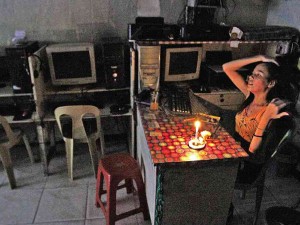ECCP urges gov’t to focus on energy security

An attendant at an Internet cafe in Makati City waits for electricity to come back as a massive power outage leaves a large part of Luzon, including Metro Manila, without power on Wednesday, May 8, 2013. The Aquino administration must redouble its efforts toward ensuring energy security for the country if it wants to attract more investors, according to the European Chamber of Commerce of the Philippines. RAFFY LERMA
The Aquino administration must redouble its efforts toward ensuring energy security for the country if it wanted to attract more investors, the umbrella organization of European companies operating here said on Friday.
According to the European Chamber of Commerce of the Philippines (ECCP), improving the supply, stability and quality of energy should be made a priority by President Aquino in the second half of his term.
“The government has to speed up its infrastructure build-up and ensure consistency in business policies to address the perennial worries of the business community, which are the dismal lack of infrastructure like roads and power facilities along with conflicting policies at the national and local levels that are anathema to sustainable high growth,” ECCP vice president for external affairs Henry Schumacher said in a statement.
The group said that while the recent upgrades granted to the country by credit-rating firms were a positive development, greater effort has to be exerted on the energy front to help create a domestic environment that was “truly conducive to job-friendly investments.”
Doing so would help prevent a repeat of the power crisis that plagued the country in the early 1990s, the group said in a position paper.
Article continues after this advertisementIn particular, Schumacher pointed out that the energy department must prioritize a power project at the Subic Bay freeport to ensure stable power supply not only at the special economic zone but in the rest of Luzon as well. Doing so would help assure prospective locators that their businesses would not suffer crippling outages in the years ahead that undermine productivity and competitiveness.
Article continues after this advertisementA consortium led by businessman Manuel Pangilinan is putting up a coal-fired plant at the Redondo Peninsula that will generate 600 megawatts, which will help meet the rising power demand at the freeport and the rest of Luzon.
Schumacher expressed concern that the Subic power project had encountered a roadblock due to “misguided opposition by certain groups that have raised false environmental issues despite the fact that this coal-fired facility will be using state-of-the-art technology to generate power that is clean, stable and affordable.”
The government has to consider the importance of addressing the issue of a possible tight power supply in the short- and medium-term instead of capitulating to unfounded environmental concerns, the ECCP official said.
Based on the DOE’s Power Development Plan for 2012-2030, the ECCP said the annual demand growth of 4.8 percent for Luzon translated to a need for additional capacity of 10,500 MW until 2030, or about 600 MW annually starting 2016.
The credit-rating upgrades notwithstanding, investors would continue to hesitate in setting up businesses in the country unless they could be assured of adequate and steady power supply, the ECCP said.
“Malacañang must take crucial steps to make the country a haven for investments,” Schumacher added. “This can be done through a stable policy environment and more-than-enough infrastructure to cater to investors.”
The official noted that ECCP intended to raise these issues at an energy forum in late May or early June, especially since several focus group discussions with industry sectors all pointed to power supply stability and quality as the major concern of businesses.